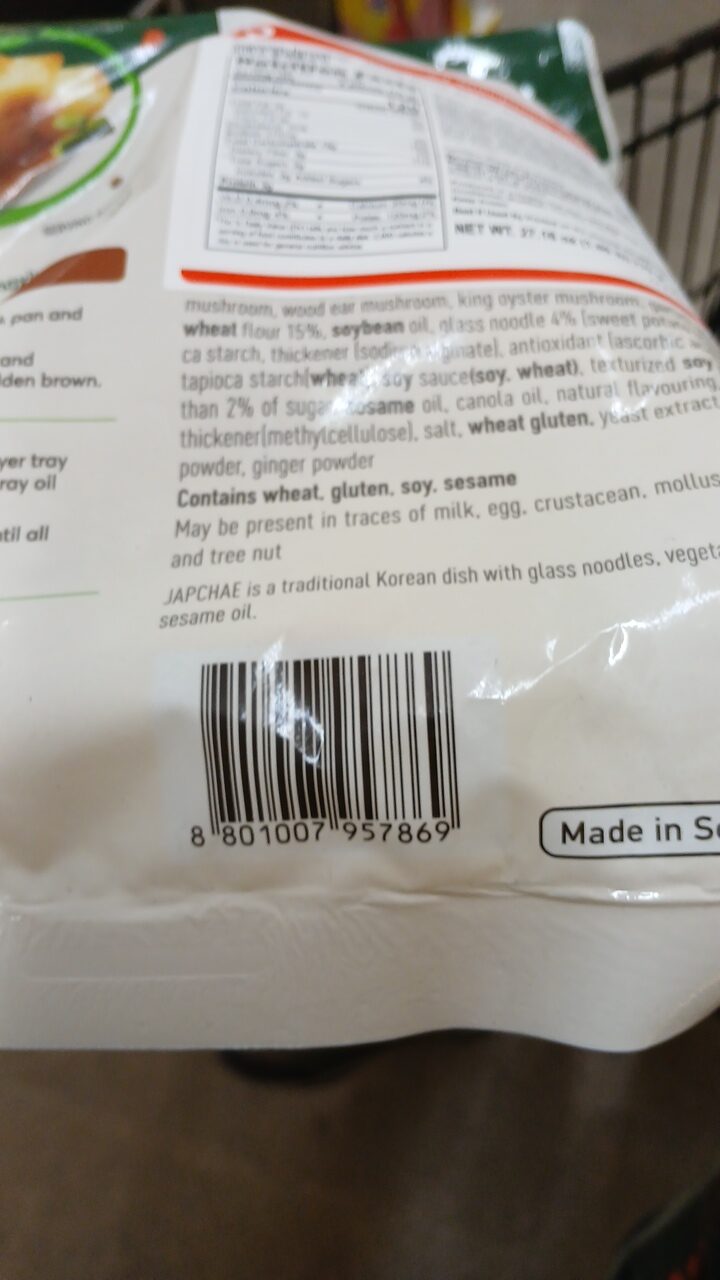
Barcode: 8801007957869
JAPCHAE
HALAL
📝 Reason: The ingredient analysis above is based on ingredient names and IFANCA, Muslim Consumer Group, and Halal ingredient guides. Plant-based ingredients are Halal. ‘Natural flavourings’ and ‘Powder’ are classified as Doubtful due to lack of disclosure and possible presence of non-halal carriers or substances. According to Islamic law (Quran 5:3), any doubtful ingredient without clear origin should be avoided unless certification or clarification is provided.
🏷️ Category: Korean Food
📄 Certificates: Made In S
Ingredients:
Details
Understanding the Halal Status of JAPCHAE
JAPCHAE, a popular Korean dish renowned for its delicious flavor and unique texture, is often sought after by Halal-conscious consumers. With a blend of various ingredients, understanding its Halal status is vital for those adhering to dietary laws. Let’s explore what makes JAPCHAE Halal and the details of its ingredients.
Halal Status Explanation
The current status of JAPCHAE is classified as Halal. This conclusion is supported by ingredient analysis based on reputable sources such as IFANCA, Muslim Consumer Group, and established Halal ingredient guides. Most components are plant-based, which is a positive sign for Halal compliance. However, we must remain cautious regarding some unclassified elements to ensure full compliance.
Ingredient Breakdown
JAPCHAE consists of a variety of ingredients, each evaluated for its Halal status:
- Mushroom: A plant-based ingredient, mushrooms are Halal (Source: halalharam.org).
- Wood Ear Mushroom: Another form of edible fungi, the wood ear mushroom is also plant-based and Halal (Source: halalharam.org).
- King Oyster Mushroom: Similar to other mushrooms, it is a Halal and nutritious ingredient (Source: halalharam.org).
- Wheat Flour: Milled from wheat grains, this ingredient is plant-based and Halal (Source: Muslim Consumer Group).
- Soybean Oil: A common vegetable oil derived from soybeans; fully Halal (Source: halalharam.org).
- Glass Noodle: Generally made from starch, these noodles are typically plant-based and Halal (Source: Wikipedia).
- Sweet Potato Starch: This ingredient is derived from sweet potatoes and is Halal (Source: Muslim Consumer Group).
- CA Starch: Calcium-enhanced starch, usually Halal and derived from plants (Source: FoodChem Additives).
- Thickener: As a generic term, thickeners are typically plant-derived; thus usually Halal (Source: FoodChem Additives).
- Sodium Alginate: This polysaccharide derived from seaweed is Halal (Source: FoodChem Additives).
- Antioxidant L-ascorbic Acid: Primarily derived from vitamin C, Halal status may vary, but generally acceptable (Source: IFANCA).
- Tapioca Starch: This is a known plant-based starch and is Halal (Source: halalharam.org).
- Soy Sauce: Most commercial soy sauces contain less than 0.5% alcohol, typically making them Halal (Source: IFANCA).
- Sesame Oil: An oil extracted from sesame seeds, it is widely regarded as Halal (Source: halalharam.org).
- Canola Oil: Derived from the canola plant, it is plant-based and Halal (Source: halalharam.org).
- Natural Flavoring: This ingredient’s source is often not disclosed and may contain non-Halal carriers, thus classified as doubtful (Source: IFANCA).
- Methylcellulose: Derived from plant cellulose, it is Halal (Source: FoodChem Additives).
- Salt: A mineral, salt is naturally Halal (Source: halalharam.org).
- Yeast Extract: This is generally Halal unless combined with Haram additives (Source: halalharam.org).
- Powder: Lacking specificity, this ingredient is classified as dubious and should be approached cautiously (Source: IFANCA).
- Ginger Powder: A spice derived from dried ginger, which is Halal (Source: halalharam.org).
Conclusion
In summary, JAPCHAE is primarily composed of Halal ingredients, with a few exceptions that may require further scrutiny. It is vital for consumers to carefully read labels and validate sources of natural flavorings and powders due to their vague nature. Nevertheless, the majority of the dish remains compliant with Halal standards, making it a delightful choice for those seeking Asian culinary experiences while adhering to their faith. Always check for certifications to confirm the Halal status of processed foods.
